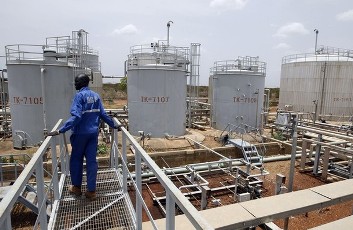Sudan says south’s oil revenues will strengthen SPLA if allowed to export through its territories
April 24, 2012 (KHARTOUM) – The Sudanese government on Tuesday said that it will never change its mind on not allowing landlocked South Sudan to transport its oil through the north’s oil facilities.

Khartoum accused Juba of causing destruction in Heglig oil facilities and vowed to sue South Sudan over the issue. But South Sudan officials claim that it was bombs dropped by the Sudanese air force during the fighting that caused the damage to Heglig’s oil infrastructure.
Sudanese president Omer Hassan Al-Bashir also announced that his country will not allow Juba to use its pipelines anymore.
Mustafa Osman Ismail, an adviser to Bashir, told youths celebrating the recapture of Heglig in Khartoum that his boss was right when he declared this move last Friday because the revenue goes to rebel groups.
“Even if we are given [a] third of its revenues [we will not let them export through Sudan] because they are conspiring against Sudan by supporting militias,” Ismail said.
“The money will obviously go to [the] SPLA and help strengthen its troops. We will also never let any food go to South Sudan because it will directly go to the SPLA”, he added.
Sudan and South Sudan persistently exchange accusations on supporting rebel groups in each others’ country, but both sides deny the allegations.
When South Sudan occupied Heglig, Khartoum also said that it will never negotiate with South Sudan over pending issues such as oil and borders.
Bashir told troops in Heglig on Monday that the only means of negotiations South Sudan understands is “language of guns”.
But the presidential adviser said his government is ready to negotiate with South Sudan but it must cease support to northern rebel groups, particularly the SPLM-North which is fighting the government in Blue Nile and South Kordofan.
“If the security issue is solved then we can say, we will talk on the rest of issues. SPLM must not support rebels, and Sudanese militias,” he said.
“Whether they are from Darfur, Nuba mountains, and Blue Nile. All SPLM or other rebels should leave Sudanese territories” Osman said.
The borders between Sudan and South Sudan are over 2.000 kilometers long and inhabited mostly by tribes half in each country making it difficult to control raising concerns of security.
Osman underscored the issue of security should be addressed with South Sudan before anything else.
“We are convinced that the problem between Sudan and South Sudan is a security problem, this is our a major headache it is not trade” he said.
The two territories went their separate ways last year without settling a list of bitter disputes over the position of their shared border, the ownership of key territories and how much the landlocked South should pay to transport its oil through Sudan.
The disputes have already halted nearly all the oil production that underpins both struggling economies.
(ST)
